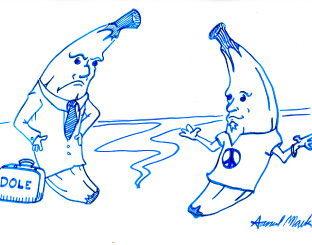SGA has introduced a new initiative to completely ban Chiquita bananas from the dining halls. Two years ago students at Connecticut College first realized that the bananas served in the dining halls were products supplied by Chiquita, an American multinational corporation known for committing a number of human rights violations as well as harming the environment.
Chiquita has funded dictatorships in Latin America in order to acquire cheap land to grow bananas. They have also hired local and indigenous people at low wages to more easily exploit them and maintain an anti-union policy. In 2003 Chiquita admitted to funding a terrorist organization, Revolutionary Armed Forces of Colombia, and still continued to fund them for another year. In 2007 the company pled guilty to funding the Colombian paramilitary group United Self-Defense Forces of Colombia, and was ordered to pay $25 million in fines as part of a deal with the U.S. Department of Justice. Chiquita controls 25% of the global banana market, making it close to a monopoly.
The production of Chiquita bananas has also been found to be detrimental to the environment. Chiquita buys illegal fertilizers from the U.S. and Europe for their bananas, which makes the soil difficult to reuse. The company must destroy forests to continue growing bananas. Chiquita uses many toxic herbicides and pesticides, making the people who work in the production of the bananas sick, causing birth defects and polluting both the water and the soil in their environment, as well as harming coral reefs.
Many of the students involved in environmental activism on campus would prefer the complete elimination of bananas on campus. They argue that bananas are a remarkably unsustainable fruit even when certified free trade and organic, because producers need to continuously cut down forests in order to grow them because of how harsh bananas are on the soil. However, students recognize that this goal is far more difficult to achieve since many students would not support it.
Professor Manuel Lizarralde of the Anthropology Department agrees that the bananas should be eliminated, and told the students, “If you want to reduce social and ecological injustice I recommend not eating Chiquita or Dole bananas.”
The Chiquita banana campaign began with a series of talks and a successful petition to eliminate Chiquita bananas. However, when the SGA Chair of Diversity and Equity, Juan Pablo Pacheco ’13, arrived on campus during orientation, he noticed the dining hall was once again serving that brand of banana. He then began to research the matter and spoke with Ingrid Birkman and Mike Kmec of dinning services.
The directors of dining services explained that the fair trade Turbana bananas the school serves during the academic year cost more during times of low demand, such as winter and summer breaks. It is fiscally impractical to buy Turbana throughout the year, and therefore dining services eliminated Chiquita bananas only during the normal school year, bringing back the cheaper bananas whenever the general student body is no longer on campus.
Kmec, the director of purchasing for dining services at Conn, stated that his job is to satisfy the consumer, in spite of the fact that many students feel that the school is supporting Chiquita’s appalling exploitation and damage of the environment in order to get cheap bananas.
“Dining services is customer driven. If the consumer wants something, we will get it,” said Kmec.
Pacheco argued that our school “shouldn’t exploit people and countries based on the personal desires” of people who eat in Harris over breaks. After students learned about why the bananas had returned, the campaign for Banana Week began.
Pacheco gathered together a group of students, including many involved in art, music and theater, in order to harness their creative skills and create a performance to educate people about the problems with Chiquita bananas.
“To get people’s attention, we need support. Artistic performances are incredibly powerful to create a culture of speaking out and saying how you feel,” said Pacheco. The students created an educational performance for the demonstration that took place in Harris dining hall on September 25.
Kmec gave the permission for the presentation, stating that “We can be a tool for education, but not an enforcer. They are adults and it is their job to educate themselves.”
Later in the week, students held the event “The True Cost of Chiquita,” inviting different people to speak about the controversy surrounding Chiquita bananas. Speakers included Kmec and Lizarralde, as well as several students involved in the campaign. They began a petition and handed it out to the SGA senators of each dorm in order to reach their goal of support from 51% of Connecticut College students.
Chair of Environmental Affairs Elias Kauders ’12 and Pacheco agree that if they do not get the 51% of signatures needed from the dorm senator petitions, they will go door to door talking directly to students, asking for their support. However, even if they do succeed in getting more than half of the signatures of the student population at Conn, dining services may not eliminate the Chiquita bananas completely.
The issue is more complicated during breaks because students are not the only ones eating in the dining hall. There are many conference guests during summer breaks who pay $30 a day (as compared to the $10 a day that Conn students pay), and they demand bananas. Kmec explained that it would be impossible for dining services to get the conference guests to agree to ban the bananas since they are not regular visitors to the college, and it is the high price they pay that allows Conn students to only pay $10 a day in Harris over the summer.
By all indications, the commitment of student activists to ban Chiquita on campus ensures that the presence of the bananas will continue to be controversial. •










